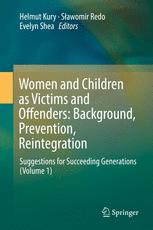

Most ebook files are in PDF format, so you can easily read them using various software such as Foxit Reader or directly on the Google Chrome browser.
Some ebook files are released by publishers in other formats such as .awz, .mobi, .epub, .fb2, etc. You may need to install specific software to read these formats on mobile/PC, such as Calibre.
Please read the tutorial at this link: https://ebookbell.com/faq
We offer FREE conversion to the popular formats you request; however, this may take some time. Therefore, right after payment, please email us, and we will try to provide the service as quickly as possible.
For some exceptional file formats or broken links (if any), please refrain from opening any disputes. Instead, email us first, and we will try to assist within a maximum of 6 hours.
EbookBell Team

4.0
66 reviewsThis work compiles experiences and lessons learned in meeting the unique needs of women and children regarding crime prevention and criminal justice, in particular the treatment and social reintegration of offenders, and serves a as a cross-disciplinary work for academic and policy-making analyses and follow-up in developing and developed countries.
Furthermore, it argues for a more humane and effective approach to countering delinquency and crime among future generations. In a world where development positively depends on the rule of law and the related investment security, two global trends may chart the course of development: urbanization and education. Urbanization will globalize the concepts of “justice” and “fairness”; education will be dominated by the urban mindset and digital service economy, just as a culture of lawfulness will. This work looks at crime prevention education as an investment in the sustainable quality of life of succeeding generations, and at those who pursue such crime prevention as the providers of much-needed skills in the educational portfolio. Adopting a reformist approach, this work collects articles with findings and recommendations that may be relevant to domestic and international policymaking, including the United Nations Studies and their educational value for the welfare of coming generations. The books address the relevant United Nations ideas by combining them with academic approaches. Guided by the Editors’ respective fields of expertise, and in full recognition of academic freedom and “organized scepticism”, it includes contributions by lawyers, criminologists, sociologists and other eminent experts seeking to bridge the gap between academic and policy perspectives, as appropriate, against the international background, including the United Nations developments.
The first volume opens with a foreword by Marta Santos Pais, the United Nations Special Representative of the Secretary-General on Violence against Children, and a general introduction by the editors. Part I provides an overview of United Nations principles for crime prevention and the treatment of women and children. Part II concentrates on education and the social learning of children and adolescents. The importance of quality education is stressed as is its impact on the behaviour of children of all ages. It also includes a discussion of the factors that still hinder access to good schooling in many parts of the world. Part III presents international research findings on children, juveniles and women both as victims and offenders. Statistics show overwhelmingly that these groups are more often victims than offenders.